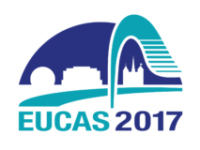Speakers
Description
Abstract
The Josephson effects are the basis for many applications in the field of superconducting electronics. First there will be a discussion of these effects from theoretical aspects up to applications. After introduction of single Josephson junctions different circuits will be introduced like superconducting quantum interference devices (SQUIDs) and many junction arrays. Well-established applications like the voltage standard and SQUIDs as very sensitive sensors will be discussed. The superconductor digital electronics reaches from classical logic circuits up to advanced devices. As one realization of quantum computing devices circuits with Josephson junctions show promising performance and will be discussed in detail
Speaker Bio.
Paul Seidel.
Paul Seidel is professor of Applied Physics and head of the Low Temperature Physics Department at Institute of Solid State Physics of the Friedrich Schiller University Jena, Germany. He works in the field of superconductivity since 1975. His research interests are Josephson effects and tunnelling in superconducting devices, thin film SQUIDs and their applications, surface and transport properties in epitaxial layer systems, cryogenics, and material science at low temperatures. Prof. Seidel got an Alexander von Humboldt fellowship and acts as a guest professor at the University Bonn, Germany as well as at the University Osaka, Japan. He has authored more than 300 papers in peer-reviewed journals. Prof. Seidel is member of the German Physical Society, the Materials Research Society and the European Society of Applied Superconductivity (ESAS) since their foundation. Since 2015 he is the secretary of the ESAS president. He worked in advisory boards of international conferences and workshops, like ASC, ISEC and EUCAS. He was the editor of the book “Applied Superconductivity – Handbook on devices and applications”.
Pascal Febvre.
Pascal Febvre has been working on superconducting electronics since 1991 when he started to develop submillimeter superconducting heterodyne receivers for radioastronomy applications at the Observatory of Paris, France and at NASA-JPL in Pasadena, California. Since 1997, Pascal Febvre is in the IMEP-LAHC laboratory (CNRS UMR5130) of University Savoie Mont Blanc in France. He built a research activity aimed at developing fast digital superconducting electronics based on the Rapid Single-Flux-Quantum (RSFQ) technique. He has been involved in several national and european projects related to superconducting electronics in the microwave and THz frequency range. He is currently involved in the development of digital Superconducting Quantum Interference Devices (SQUID) magnetic sensors for geophysics applications with the Low-Noise Underground Laboratory (LSBB – CNRS UMS3538) of Rustrel in France, and collaborates with several groups in Germany, Italy, South Africa, Turkey and Ukraine.
